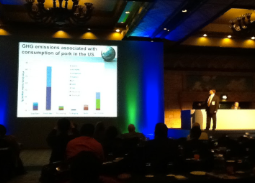Dr. Marty Matlock, Professor of Biological and Agricultural Engineering, University of Arkansas (UA), Executive Director, UA Office for Sustainability, and Program Director, UA Division of Agriculture Center for Agricultural and Rural Sustainability, presented the keynote address on sustainability at the 4th Global Feed & Food Congress (GFFC) April 10th, at the Sun City Resort in Sun City, South Africa. Dr. Matlock’s keynote topic was “The role of animal agriculture in feeding 10 billion people sustainably.” His keynote address was sponsored by Novus International, a feed additive and animal nutrition company based in St. Louis, MO, with a manufacturing facility in Little Rock, AR.

“The challenges, opportunities and potential risks related to sustainable agricultural production are a direct result of competing land uses,” Dr. Matlock notes.
Agricultural production, including crops, pasture and grazing, currently utilize more than 40 percent of the Earth’s surface. In order for global agricultural producers to meet the increasing demand for food, feed, fiber and fuel, while at the same time reducing inputs and impacts, we must use every tool currently available in our collective tool box and continue to develop innovative tools that address emerging problems in an efficient, earth-friendly manner. Our future success is dependent on what we do today.
“Novus shares Dr. Matlock’s perspective on sustainability and supports his research efforts in this area. Sustainable agriculture and animal production are essential to achieving Novus’s vision of feeding the world affordable, wholesome food and achieving a higher quality of life. Novus is proud to align ourselves with Dr. Matlock and others in the industry that share our view of global sustainability and the role and responsibility we all have to advance this aspiration,” said Thad Simons, President and CEO of Novus International. “Working as one, we will satisfy the growing demand for sustainable protein.”
“Prosperity for humanity is the single most important desired outcome in finding solutions for a growing population during the next forty years. And prosperity is not something that will be achieved through subsistence agricultural programs, but through commercialization and the use of technology” said Matlock. “The world population is expected to grow from the current 7 billion people to 10 billion by 2050. Feeding the world population will require huge increases in productivity and efficiency. Technology will have to play a central role” he said.
“Although we are, on the whole, starting to achieve levels of success, it is taking a very long time, and we are approaching the boundaries of our natural resources. This is the core of my message: embracing every available technology to achieve the collective aim as quickly and effectively as possible.”
